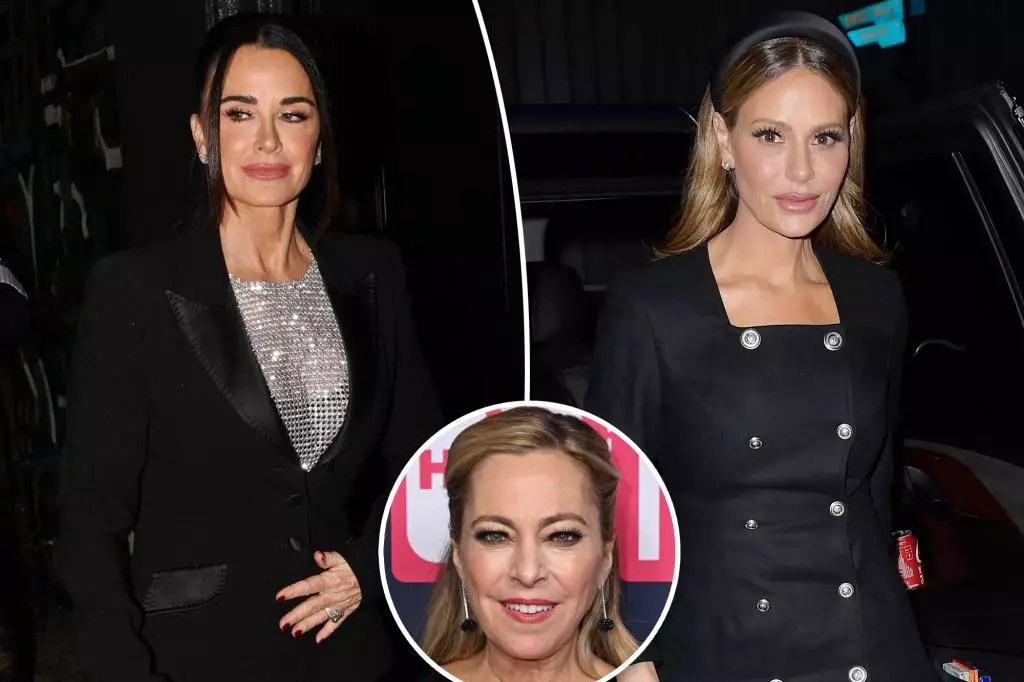In the glittering world of reality television, where personal lives are a constant subject of public scrutiny, the cast of “The Real Housewives of Beverly Hills” (RHOBH) often finds itself embroiled in a web of drama that fully engages viewers. Recent comments made by show star Kyle Richards illuminate an ongoing rift between her co-stars Dorit Kemsley and Sutton Stracke regarding plastic surgery – a feud that reflects deeper personal conflicts and the oftentimes superficial nature of social currency within their exclusive Hollywood enclave.
Richards, the show’s veteran at the age of 55, publicly condemned the ongoing banter about physical appearances and financial situations, calling it “ugly.” Her stance reveals not just her disapproval of the recurring theme on reality television but also offers an insight into her character. She advocates for a paradigm where disputes can occur without resorting to personal attacks, suggesting that contention should remain high but respectful. Richards contextualizes her position by referencing her own conflicts on the show, indicating that arguments can maintain a level of decorum, ultimately promoting an environment where character assassination isn’t the norm.
The feud escalated when Sutton Stracke, during a game segment with fellow star Lisa Barlow from “Real Housewives of Salt Lake City,” made light of Kemsley’s choice to undergo plastic procedures. With the quip that “when you’ve had enough surgery, anybody can be pretty,” Stracke inadvertently highlighted both the absurdity and the pressures of unattainable beauty standards prevalent in their high-profile social circle. The notion that physical enhancements equate to beauty is not just reductive but also fortifies the damaging belief systems that dictate self-worth and acceptance, especially within the context of reality television.
Kemsley’s retort to Stracke’s comment, questioning why her co-star hadn’t opted for surgery if it were so easily accessible, only underscores the vicious cycle of judgment that entangles the group. This exchange is a microcosm of the larger conversation about self-image, authenticity, and the societal pressure to conform to an idealized version of beauty. Kemsley’s assertion might suggest an insecurity masked as confidence, a theme not uncommon in reality television narratives.
With the anticipation of Season 14 of RHOBH on the horizon, viewers can expect that the ongoing Kemsley-Stracke saga will ignite fresh storylines, as their disputes extend beyond mere gossip into the territory of personal growth—or lack thereof. Will they address the ethical implications of their comments? Or will the entire scenario devolve once more into juvenile bickering? One thing is certain: reality television thrives on hyperbole, and the stakes in this glamorous yet vicious ecosystem are continually raising.
Ultimately, Richards’ commentary serves as a reminder that while reality TV may be an arena of escalating drama and excessive lifestyles, it can also function as a reflection of broader societal values. As viewers, we must navigate these narratives with a critical eye, recognizing the inherent complexities and nuances that lie beneath the surface of manufactured conflicts. In a world that often prioritizes appearances over substance, the discourse within RHOBH serves as a poignant reminder of the real feelings, insecurities, and challenges that individuals face in their quest for acceptance and identity.







Leave a Reply